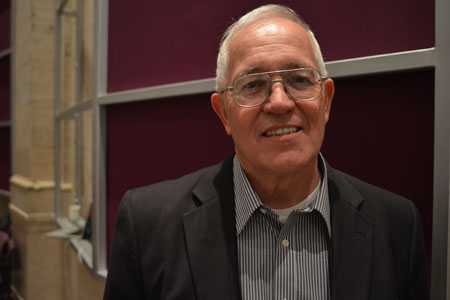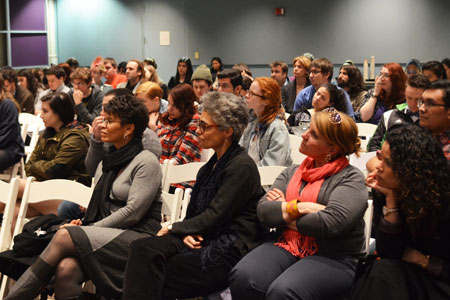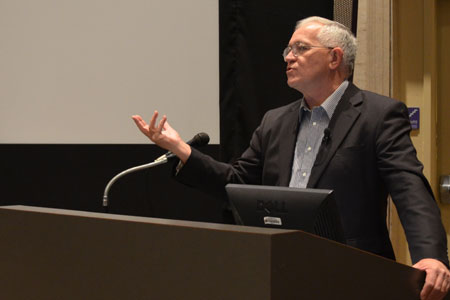Mexico border, immigration issues discussed
Ruben Garcia, director of Annunciation House in El Paso, Texas, a shelter and resource center for immigrants, spoke at the Bordy Theater on April 9 about the realities of immigration in the United States.
Garcia’s visit was part of Emerson’s Understanding National Immigration Through Education (UNITE) week of events.

Ruben Garcia of Annunciation House at Bordy Theater. (Photo by Erin Connolly ’15)
“Little by little those stories began to change me,” he said of the immigrants he worked with. “I began to understand an intimate connection between me and the people arriving at the house.”
Garcia said he hoped to unsettle the audience with a new realization of just how connected the United States is to the lives of immigrants.
The Annunciation House has provided hospitality to more than 80,000 people who have come to the United States. Many who arrive there have no other option. They leave their home countries and come to the States because it is the only possibility of supporting their families.
Garcia told the story of an undocumented woman from Honduras who came to Annunciation House. She was unable to earn enough money to feed her children so she moved to Calexico, California, a town on the Mexico border where she soon found a job. A little while later, she was kidnapped by a gang in Mexico, who beat her and raped her for months. When she escaped, she was pregnant. She tried crossing into the States for help but Border Patrol authorities picked her up and sent her to El Paso as if she were a criminal.

A sizeable crowd turned out for Ruben Garcia’s speech on immigration at the Bordy Theater. In the front row, from left, are Syliva Spears, vice president of Diversity and Inclusion; Claudia Castaneda, senior scholar-in-residence; Suzanne Hinton, director of Service Learning; and Kelly Bates, director of the Elma Lewis Center. (Photo by Erin Connolly ’15)
“They put chains on her hands, and that chain goes down to a waist chain that then goes down to ankle chains,” Garcia said.
After her release from jail a few weeks later, she gave birth while staying at the Annunciation House.
“I want you to understand, that’s the result of our immense fear of the immigrant,” he said. “Our insatiable need for security.”
In one example of interconnectivity, he asked the audience what they would all look like if they could only keep on the clothes that were made in the United States. He guessed the vast majority of the audience would have to give up all their clothing.
“So we say, it’s okay to pay people like that [60, 70 cents per hour]” to make our clothes, he said, “but God help them if they should say ‘I can’t feed my kids on that,’ and cross the border.”

Ruben Garcia at Bordy Theater. (Photo by Erin Connolly ’15)
Garcia said he hoped each person in the audience would remember his or her responsibilities that come with the privilege of living in the United States.
“A Nation of Dreams: A Conversation about Immigration and Education with Ruben Garcia” was sponsored by several campus organizations, including Emerson UNITE; the Elma Lewis Center for Civic Engagement, Learning, and Research; Office of the President; Office of Diversity and Inclusion; Office of Student Activities; the Institute for Liberal Arts and Interdisciplinary Studies; Office of Service Learning and Community Action; Office of Housing and Residence Life; Emerson Reform; AMIGOS; and Emerson Peace and Social Justice.
Categories